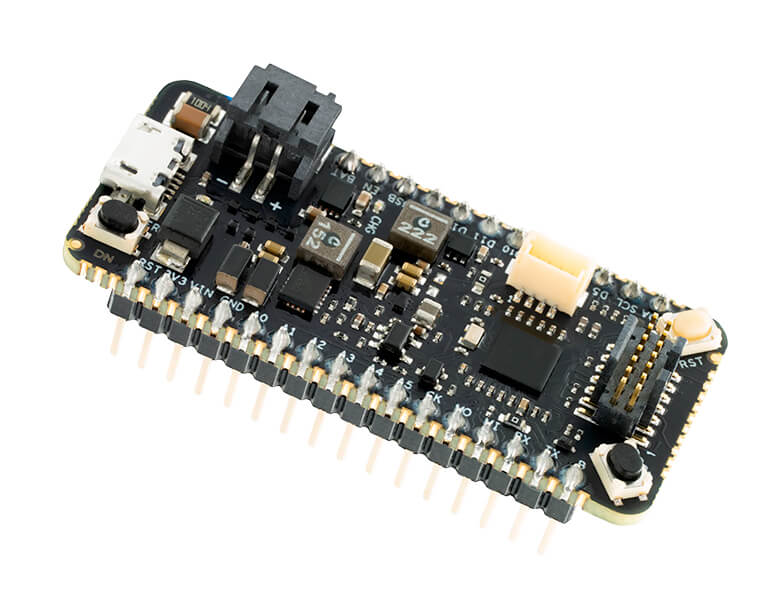
Swan R5 by Blues Wireless
Swan is a low-cost embeddable STM32L4-based microcontroller designed to accelerate the development and deployment of battery-powered solutions. It is especially useful for applications requiring large memory or a high degree of I/O expandability at an affordable cost, such as edge inferencing and remote monitoring.
Uniquely for Feather-compatible boards, Swan is designed to satisfy developers’ needs that span from early prototyping through high-volume deployment. Developers may begin to use Swan in conjunction with Adafruit’s myriad sensors and FeatherWing-compatible carriers. Due to its novel design, for high-volume deployment the low-cost Swan can also be soldered directly to a parent PCB integrating those sensors, utilizing the full range of Swan’s I/O capabilities.
The board has three independent power options – USB, Battery, or Line power – and provides a software-switchable 2 Amp regulator for powering external sensors. When operating in its low-power operating mode, the entire Swan board commonly draws only about 8uA while retaining all of its memory, making it quite suitable for battery-powered devices.
Swan Features
- Ultra low-power Arm Cortex-M4 core clocked at 120Mhz
- STM32L4R5-based microcontroller
- 2MB of flash and 640KB of RAM
- Qwiic connector
- Support for Notecard Outboard Firmware Update in CircuitPython
- Castellated-edge access to 55 GPIO ports including:
- 8 analog
- 16 digital
- 4x I2C, 3x SPI
- USB OTG full speed
- 1x 14-channel DMA
- tRNG
- 12-bit ADC, 2 x 12-bit DAC
- low-power RTC, and CRC calculation peripherals
Tutorial
Purchase
Contribute
Have some info to add for this board? Edit the source for this page here.
CircuitPython 9.2.8
This is the latest stable release of CircuitPython that will work with the Swan R5. Use this release if you are new to CircuitPython.
Modules included in this download
_asyncio aesio alarm analogio array atexit audiobusio audiocore audiomixer audiomp3 audiopwmio binascii bitbangio bitmapfilter bitmaptools board builtins builtins.pow3 busdisplay busio busio.SPI busio.UART codeop collections digitalio displayio epaperdisplay errno fontio fourwire framebufferio getpass gifio i2cdisplaybus io jpegio json keypad keypad.KeyMatrix keypad.Keys keypad.ShiftRegisterKeys keypad_demux keypad_demux.DemuxKeyMatrix locale math microcontroller msgpack onewireio os os.getenv pulseio pwmio rainbowio random re rtc select sharpdisplay storage struct supervisor synthio sys terminalio tilepalettemapper time touchio traceback ulab usb_cdc vectorio warnings zlibFeatures: Feather-Compatible, Battery Charging, Breadboard-Friendly
CircuitPython 10.0.0-beta.0
This is the latest development release of CircuitPython that will work with the Swan R5.
Alpha development releases are early releases. They are unfinished, are likely to have bugs, and the features they provide may change. Beta releases may have some bugs and unfinished features, but should be suitable for many uses. A Release Candidate (rc) release is considered done and will become the next stable release, assuming no further issues are found.
Please try alpha, beta, and rc releases if you are able. Your testing is invaluable: it helps us uncover and find issues quickly.
Release Notes for 10.0.0-beta.0
Modules included in this download
_asyncio aesio alarm analogio array atexit audiobusio audiocore audiomixer audiomp3 audiopwmio binascii bitbangio bitmapfilter bitmaptools board builtins builtins.pow3 busdisplay busio busio.SPI busio.UART codeop collections digitalio displayio epaperdisplay errno fontio fourwire framebufferio getpass gifio i2cdisplaybus io jpegio json keypad keypad.KeyMatrix keypad.Keys keypad.ShiftRegisterKeys keypad_demux keypad_demux.DemuxKeyMatrix locale lvfontio math microcontroller msgpack onewireio os os.getenv pulseio pwmio rainbowio random re rtc select sharpdisplay storage struct supervisor synthio sys terminalio tilepalettemapper time touchio traceback ulab usb_cdc vectorio warnings zlibFeatures: Feather-Compatible, Battery Charging, Breadboard-Friendly
Absolute Newest
Every time we commit new code to CircuitPython we automatically build binaries for each board and language. The binaries are stored on Amazon S3, organized by board, and then by language. These releases are even newer than the development release listed above. Try them if you want the absolute latest and are feeling daring or want to see if a problem has been fixed.
Previous Versions of CircuitPython
All previous releases of CircuitPython are available for download from Amazon S3 through the button below. For very old releases, look in the OLD/ folder for each board. Release notes for each release are available at GitHub button below.
Older releases are useful for testing if you something appears to be broken in a newer release but used to work, or if you have older code that depends on features only available in an older release. Otherwise we recommend using the latest stable release.
